The government has good policies.
According to Iran Gate, a debate between economist Musa Ghani Nejad and media activist Ali Alizadeh, who is left-wing and believes in the policy of resistance, was broadcasted on the fourth channel of the Islamic Republic of Iran’s television network yesterday, and it has sparked many reactions. One of the important topics discussed in this debate was the issue of government income tax, given that the government has access to oil revenues.
Alizadeh’s shocked and bewildered face in response to Ghani Nejad’s golden statement about oil money has been widely shared on social media, and the majority of social media users consider this left-wing activist to have been defeated in this debate. The debate took place last night and has garnered significant reactions from social media users and experts in the fields of economics and ideology.
Ali Alizadeh’s unconventional and scattered statements in this program were met with civilized and self-restrained reactions from Musa Ghannad. However, there was one rare occasion when this seasoned economist and graduate of Sorbonne University showed a reaction to these statements. It was when Alizadeh passionately advocated for the necessity of paying higher taxes for defense. Ghannad was able to silence him with just one sentence, as the famous saying goes.
This report focuses on the analysis of that one sentence by Ghannad, and examines the proposition of whether the Islamic Republic can or should collect more taxes from the people. Iran Gate has prepared a two-part dossier to investigate this matter. This present report is the first part of the dossier, which delves into the fundamental analysis of the issue of income tax and compares it in Iran with other countries in the world.
Why do governments collect taxes?
Taxation is the most important economic tool in the world, used by governments to finance their expenses. Governments that have alternative sources of income do not find themselves in a position where they are forced to use this tool. However, every governing structure requires financial resources to cover its expenses.
However, when governments that have complete control and monopoly over natural resources do not naturally put themselves in trouble and do not resort to tax tools to cover their expenses, oil governments, including the Iranian government, fall into this category. That is why the level of income tax in this system is much lower than in countries that do not have access to natural resources.
Do Iranians pay less tax?
When the level of income tax in different countries around the world is examined, it can be seen that the amount of tax paid by Iranian citizens is lower than the global average. This means that the Islamic Republic apparently collects less tax from its people compared to most countries in the world. However, this statement is unscientific and inaccurate, and it is the same point that Alizadeh has raised in this controversial debate and justifies the policy of maximum tax collection by the government.
To properly understand this statement, it is necessary to recognize that due to the imbalance in the distribution of natural resources among different countries, statistical analysis should be provided. As mentioned earlier, when governments have alternative sources of income, they immediately abandon tax tools and resort to other resources. That is why Iran should be compared to other rentier and oil states. Otherwise, for example, the Japanese government, which has one of the highest levels of taxation and does not have natural resources, is in a completely different situation.
So what happens to oil money?
However, by looking at the statistics of taxation among oil countries, it is clear that the Iranian government imposes the highest taxes on its citizens. Of course, this statistic is different until the late eighties, and only a part of the Iranian society, which are government employees, pay taxes. The reason for this is the uninterrupted access of the rulers to oil revenues, which has made them feel independent of tax revenues. However, the US and UN sanctions have caused difficulties for the second Ahmadinejad government in selling oil and forced them to increase the level of taxation and cover a larger portion of their expenses from this source.
This process has continued due to the intensification of sanctions in various periods, to the extent that today the Islamic Republic of Iran has the highest level of per capita taxation among oil-based economies. This is why it is said that Iranian citizens directly and indirectly pay one of the highest tax rates to the government, and Ali Alizadeh’s claims are pure falsehoods.
The second part discusses the consequences of tax collection and other reasons why governments are reluctant to collect taxes in the presence of alternative sources of revenue.
English
View this article in English

